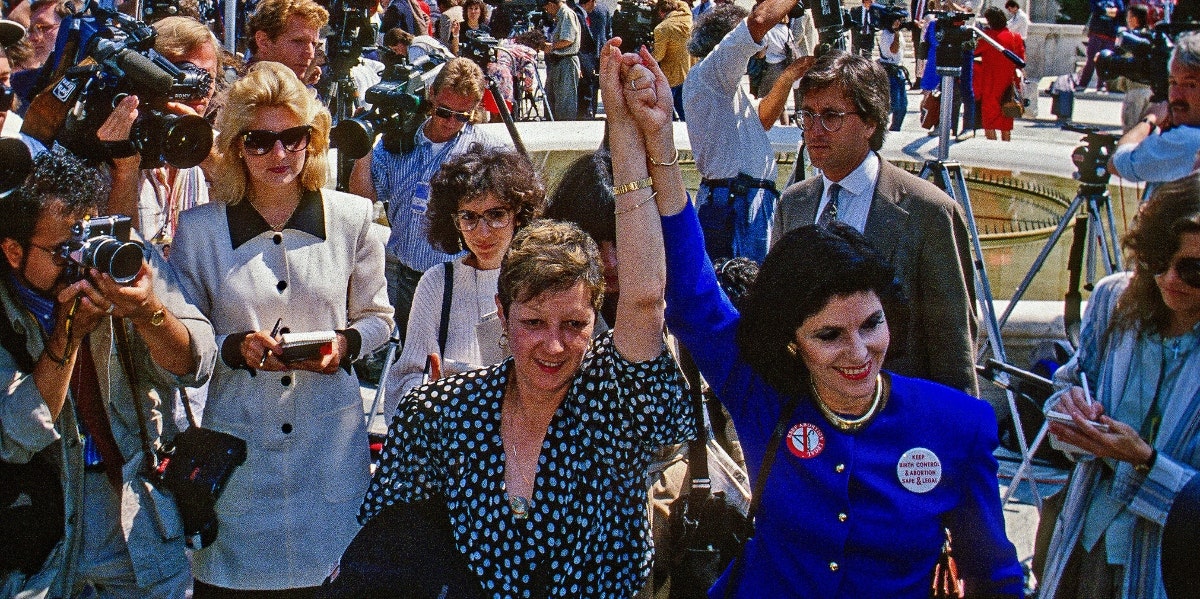What The 'Roe Baby' Wants Us To Know About Abortion 48 Years After ‘Roe V. Wade’
Jane Roe's daughter is speaking out.
 mark reinstein / Shutterstock
mark reinstein / Shutterstock As the remnants of ‘Roe v. Wade’ appears more vulnerable than ever in the US, we’re learning for the first time about the identity of the baby at the center of the landmark Supreme Court case.
Texas’ effective ban on abortions has cast a new spotlight on the 1973 Supreme Court ruling that protects a women’s right to terminate her pregnancy with minimal government interference.
But, until now, we knew nothing about the identity of ‘The Roe Baby,’ the child born to ‘Jane Roe’ who took a case in Texas to access an abortion.
We will hear her story in full for the first time in “The Family Roe,” an upcoming book by Joshua Paget.
Who is ‘The Roe Baby’?
Though the case taken by Jane Roe — whose real name was Norma McCorvey — would later enable countless women to access abortion in the US, she herself never had an abortion.
The case was still ongoing when she gave birth to her baby in 1970.
That baby’s name is Shelley Lynn Thornton — who until now has been known anonymously as ‘Roe Baby.’
Thornton didn’t find out about her birth mother or connection to the case until she was close to 19-years-old.
She had been given up for adoption at birth, an adoption that was arranged in part by McCorvey’s lawyer in ‘Roe v. Wade.’
Thornton first learned that she was a symbol in the abortion debate through a journalist who tracked her down as part of a story being written about McCorvey.
Thornton knew about McCorvey in passing and had once thought of her as “this person [who] had made it okay for people to go out and be promiscuous.”
But learning about her birth mother sparked years of complex and conflicting emotions about ‘Roe v. Wade’ and the many debates around it.
Shelley Thornton — ‘The Roe Baby’ — does not call herself pro-life.
Thornton was described as “pro-life” in the 1989 article that first connected her to mother — her name was redacted in the piece — but she insists that she never outright claimed to be anti-abortion.
At 20, after becoming pregnant unexpectedly, she and her husband-to-be briefly considered an abortion.
For the first time, she questioned why politics and religion have become so wrapped up in this choice.
“I guess I don’t understand why it’s a government concern,” she recalls now. She eventually decided against an abortion.
At the time, she didn’t fully identify with the term pro-choice due to her difficult relationship with McCorvey and beliefs.
Thornton struggled for a long time with the pain of being unwanted and battled with depression and anxiety for many years.
"When someone's pregnant with a baby and they don't want that baby, that person develops knowing they're not wanted," she explains.
She also developed a resentment for her birth mother, who she had only spoken to through letters and phone calls.
Thornton recalled one explosive conversation in which she says McCorvey insisted she should thank her for not aborting her.
“I was like, ‘What?! I’m supposed to thank you for getting knocked up … and then giving me away.’”
Thornton never met McCorvey. She learned from her half-sister that the woman was dying in 2017 and debated going to her hospital bedside but didn’t.
What ‘The Roe Baby’ wants you to know about abortion.
Thornton has never fully identified her place in the abortion debate but says if there’s one thing she wants the Roe baby to represent it’s not the sanctity of life.
Instead, she says, it’s the difficulty of being born unwanted.
She insisted she wants no part in the pro-life movement’s insistence on her being a symbol to use against abortion laws.
Perhaps this is because she recognizes that being born to a mother who was refused an abortion is not the act of saviorism anti-abortionists try to make it out to be.
Her story defies the neatly packaged arguments that exist on both the pro-choice and anti-abortion sides.
As does that of her birth mother, who has been both an anti-abortion activist and a symbol of reproductive freedom after the Supreme Court case — though, she said on her deathbed that her involvement in anti-abortion activist was “all an act” and an effort to make a living.
This is because abortion is inherently complicated and deeply personal to the individuals involved in making this choice for themselves.
It is more nuanced than many of the laws around it and has circumstances that change on a case-by-case basis.
Attempting to use one of these cases to make an example out of all women and define their choices, fails to recognize these nuances and, in turn, fails each and every one of these women.
Alice Kelly is a senior news and entertainment editor for YourTango. Based out of Brooklyn, New York, her work covers all things social justice, pop culture, and human interest. Keep up with her Twitter for more.
